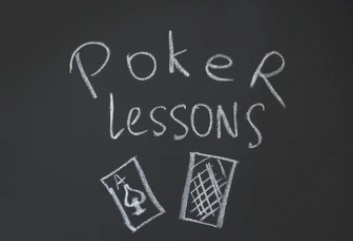This article aims to express just why, in a theoretical sense, you can’t play poker under rolled. It’s for people at all levels of the game who don’t know/haven’t read this stuff, and I really hope to be explicit. There are also points that even some of the more experienced posters may not have been aware of.
In the article I state some of the foundations of decision theory but have tried to make it as none mathematical as possible. You will need to know what $EV is and how to work it out but thats it.
A game of decisions
I have said this before but now I really must be explicit. Poker is a game of decisions. Totally obvious to some, perhaps not to others. Every time it is our turn to act we must make a decision: fold, call, raise, how much to raise, and so on. How do we make our decisions?
Based on our cards, reads (of player and situation) and the betting patterns of other players we work out a rough probability for us winning the hand (or improving to win the hand) for each decision we could make. Then we look at the $$ we win if we do win the hand given we made a certain decision, and multiply it by that probability to find our expected value of that decision. We choose what to do based on the decision with the highest expected value.
The above sums up basic decision theory. Sure we might not get our probabilities exact (or even remotely correct), but we make our best judgements and choose the corresponding correct decision. I call it the correct decision because that is exactly what it is. There can be no ambiguity once you have your probabilities estimated and the possible outcomes defined, there can be only one correct decision. (we ignore the possibility of indifference between two decisions with the same expected value as choosing one of these and no other is still "correct").
So as poker players the skill is all about reading the game correctly to get as close to those probabilities as we can. Sure I don’t mean we sit at the table and work them out in our head, but we do an equivalent personal judgement that probably doesn’t include the figures.
So that’s poker, a game of decisions. Easy no? Well not quite. The theory is not quite correct.
Utility over preferences
Ask yourself this: If i offered you a gamble where I toss a coin and give you $100 if it lands heads, would you pay me $40 to play?. My answer to this is of course yes. What about $400 for $1000? My answer is no because I can’t afford to lose $400. What about $4000 for $10000? But the decision theory says a clear yes in each case!!
This is because Absolute value of money is not the only thing we lose. Money buys things, changes life styles, makes sure you have somewhere to eat/sleep, pays for education and buys you into the next game. We have to have enough to do all those things. We don’t want our quality of life to diminish as a consequence of a decision.
And so we come to utility. Utility is a measure of how much you like a consequence. So your utility for winning lots of money is high and your utility for losing everything is low. the lowest. Now, and here’s the rub, everyone’s utility is different. Ask Phil Ivey what his utility is for $1000 (the big blind in some of his games) and it will be different to mine (half my bankroll). That much seems obvious.
So how do we estimate our utilities for consequences of poker decisions?
Well almost certainly you can’t unless you’re a very experienced statistician or working with one. So how can we make good poker decisions? The only way to be able to make coherent poker decisions (for most mortals) is to make sure your utility for the different consequences of the game is are the same as the value of the money you stand to win and lose. I.e. you are indifferent between gaining $x for certain or winning $2x with probability 1/2. Whatever x is.
Now there is always such an x for all of us. If you have $200 in your wallet and I offer you such a gamble for $1 you wouldn’t mind taking it (unless you needed the whole $200 for something specific). The other universally true thing, is that x is always much less than all of the money we have.
So let me say it clearly: In order to make poker decisions via maximised $EV YOU must be indifferent over gambles with the same $EV.
The Danger of Playing Under rolled
I said YOU in that last sentence because preferences are always personal, they are different for everyone. Maximising $EV is what all the books and what people on this forum always advocate for making the best decision. But they are wrong. You have to maximise your expected utility and make the decision best for you!
Now this brings me neatly to the Danger of playing under rolled. If under rolled, the money you are betting and making decisions with means something to you. You would rather keep $x that take a 50/50 shot at $2x, for some amount x that you’re actually gambling with. Which means that your utility for the money you are playing with is not the same as it’s Absolute value. Which means that many decisions that maximise $EV don’t maximise expected utility for you. That makes them wrong!
So the danger of playing under rolled is that many of the decisions you will make at the table and that book writers and players on this forum would advise you to make WILL BE WRONG. And they’ll be wrong for you only.
Consequences
"So my decisions are wrong. Big Deal! what does that mean?"
It means you’re losing. You’re giving away what you don’t really want to give. If you continue to make the wrong decisions for yourself, you are not getting what you want. The rewards don’t outweigh the risk and eventually, unless you stop, you’ll go broke. Why take gambles you expect to lose? Utility is a measure of your personal preference and choosing things you prefer less over things you really want is absolutely ridiculous as I’m sure you’ll agree.
If you do wish to play under rolled, you must understand that the correct decision for any situation you face will often be different from the correct EV decision, and that decision is TOTALLY PERSONAL. How can people on this site advise you without knowing how your preferences are scaled? The problem is that you won’t know really either, so unless you guess right, you’ll make bad decisions.
What is a proper bank roll then?
A proper bank roll allows you to play at the stakes you wish to play so that your utility for any amount bet in that game is precisely the $$ value of that bet. Which is to say that for any $x you wish to bet you are indifferent between keeping $x or taking a 50/50 shot at $2x. That’s it.
A proper bankroll is necessarily then different for each stake and for each player. There are amounts suggested everywhere as general guidelines. These are based on the sizes of the swings you expect to see in that game but all are designed so that you don’t worry about losing a buy-in or three. If you do worry about it, you are not properly rolled and are making bad decisions for yourself.
Once you have a proper bankroll, advice posted here and in books is all correct again!
Conclusions
Playing correctly under rolled is very difficult.
You will likely make bad decisions left right and centre.
You will lose opportunities at the table to make money because your preference for keeping what you have is higher.
You thus become exploitable. You should fold to bigger bets more often, which if spotted leaves you open to being pushed out of more than your fair share of pots.
Your risks are greater than the possible rewards.
No hand advice on this site or any other applies to you.
I hope this has been informative for you. Some of the language may seem complicated and you may not have quite understood what a utility was, but I hope you at least take away the message about playing under rolled and why you shouldn’t do it.
For the more experienced posters, if you didn’t know some of this stuff I hope you found my outline to decision theory and the mathematical explanaitation behind the insanity of playing under rolled interesting. I’d also like to re-enforce the point that, when someone is under rolled and asks for advice, the right decision depends entirely on him and his attitudes and preferences. You can only help with the probability side and not with the decision.
I’ll write another article in a similar vain on the subject of playing over rolled quite soon.
GingerWizard
Submit your review | |








